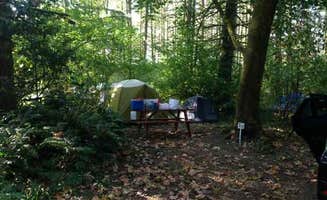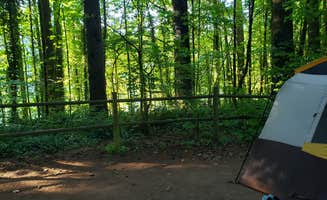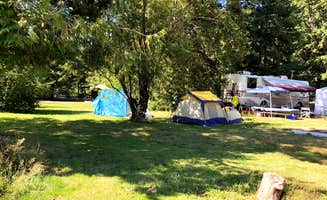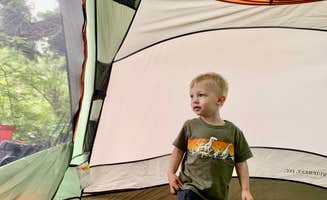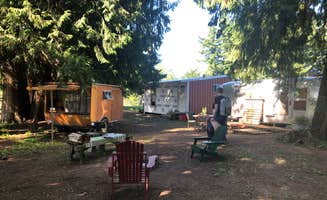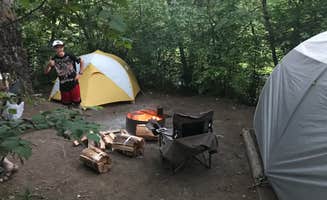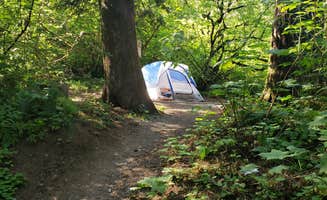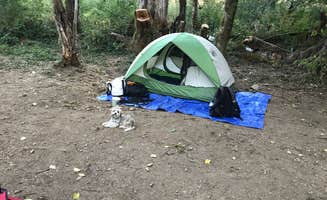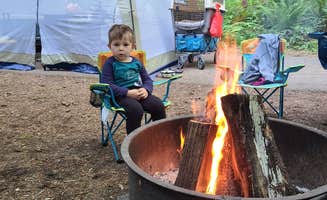The Columbia River and surrounding areas create a varied landscape of waterways, volcanic formations, and wooded riverbanks for camping spots near Vancouver, Washington. Elevations range from near sea level at riverfront campgrounds to around 500 feet at higher-elevation parks, with summer temperatures typically reaching 75-85°F during peak camping season. Many campgrounds remain accessible year-round, though amenities may be limited during winter months.
What to do
Disc golf courses: At Milo McIver State Park Campground, you'll find competitive-level disc golf facilities. "That's right, two competition quality disc golf courses. Not into disc golf or rafting? Then you probably won't see those folks at all," explains Nancy H., highlighting how the park balances different recreational uses.
Riverside activities: The Clackamas River provides opportunities for paddling and fishing. "You can walk to a sand beach and take an Uber to downtown Portland for about $25," shares Ben I. from Reeder Beach RV Park, emphasizing the mix of natural and urban accessibility.
Historical exploration: Champoeg State Heritage Area offers educational opportunities focused on pioneer history. "The campground is very well laid out and there are plenty of hiking and biking trails right from your campsite," notes Thamar D., describing the area's versatility.
What campers like
Lake swimming: Battle Ground Lake State Park Campground offers a unique volcanic lake experience. "They have a cool volcanic lake with a swimming area and great fishing. Its like a mini crater lake. I mean mini like pond size," explains Ashley Y., providing perspective on the lake's size and origin.
Urban proximity with nature feel: Many campers appreciate how close these camping areas are to Portland while still feeling remote. "Barton is beautiful and the gateway to our annual Float With Friends," shares Brittany P., highlighting the social aspect of camping close to the city.
River views: Watching river traffic becomes an unexpected attraction at waterfront campsites. "Eating apple pie and watching 20 story tall container ships glide by was neat," describes Ben I. from Reeder Beach, showing how riverside camping creates unique experiences.
What you should know
Site privacy varies significantly: Some campgrounds offer more secluded spots than others. "In the tent/rv loop, sites 1-30 are all in the open along the grass with no separation between them. Sites 31-59 are set back into the woods with a bit more privacy and separation," notes Reid B. about Barton County Park Campground, providing specific site numbers for better selection.
Water quality concerns: Not all campground water is suitable for drinking. "Water has arsenic and is no good to drink or cook with. You have to bring your own water, or buy theirs, which they don't mention on their website," warns Z R. about Reeder Beach RV Park, highlighting an important preparation detail.
Campsite carry distance: Some tent camping areas require carrying gear from parking areas. "The only thing to keep in mind is that you have to park down below and walk to the site, the furthest ones being over a quarter mile away," advises Matt W. about Battle Ground Lake, helping campers prepare for the hike-in requirement.
Tips for camping with families
Playground access: Oxbow Regional Park offers upgraded play facilities. "The recent upgrades to playgrounds are awesome for the kids and the new welcome center makes check in a breeze," shares Finn M., noting facility improvements that enhance family camping.
Multi-activity parks: Look for campgrounds with diverse recreational options. "The kids enjoyed the two playgrounds, wading in the river, and walking some nature trails. The park also offers horseshoe pits, volleyball courts and a boat ramp," notes Reid B. about Barton County Park.
Bike-friendly locations: Many parks feature paved paths ideal for children learning to ride. "Great biking trails that are kid friendly. There lots of historical sites around the campground to enjoy as well," Scott W. says about Champoeg State Heritage Area, emphasizing educational opportunities combined with recreation.
Tips from RVers
Urban camping conveniences: Columbia River RV Park provides strategic positioning for exploring Portland. "We don't have a tow car so we relied on public transportation to get to downtown, which was great (though it is a 1 mile walk to the bus stop)," explains Laura M., highlighting transportation logistics.
Late arrival considerations: Some parks offer after-hours check-in services. "We arrived late in the evening, and the staff met us and showed us to our room, which was especially helpful in the dark," shares Fondofo D., noting a valuable service for travelers arriving after office hours.
Laundry facilities: Pet owners appreciate dedicated pet laundry options. "The laundry room had a designated pet washer and dryer, which I always love, so we washed all of our dog bedding here," mentions Laura M. about Columbia River RV Park, highlighting a specialty amenity not commonly found.


